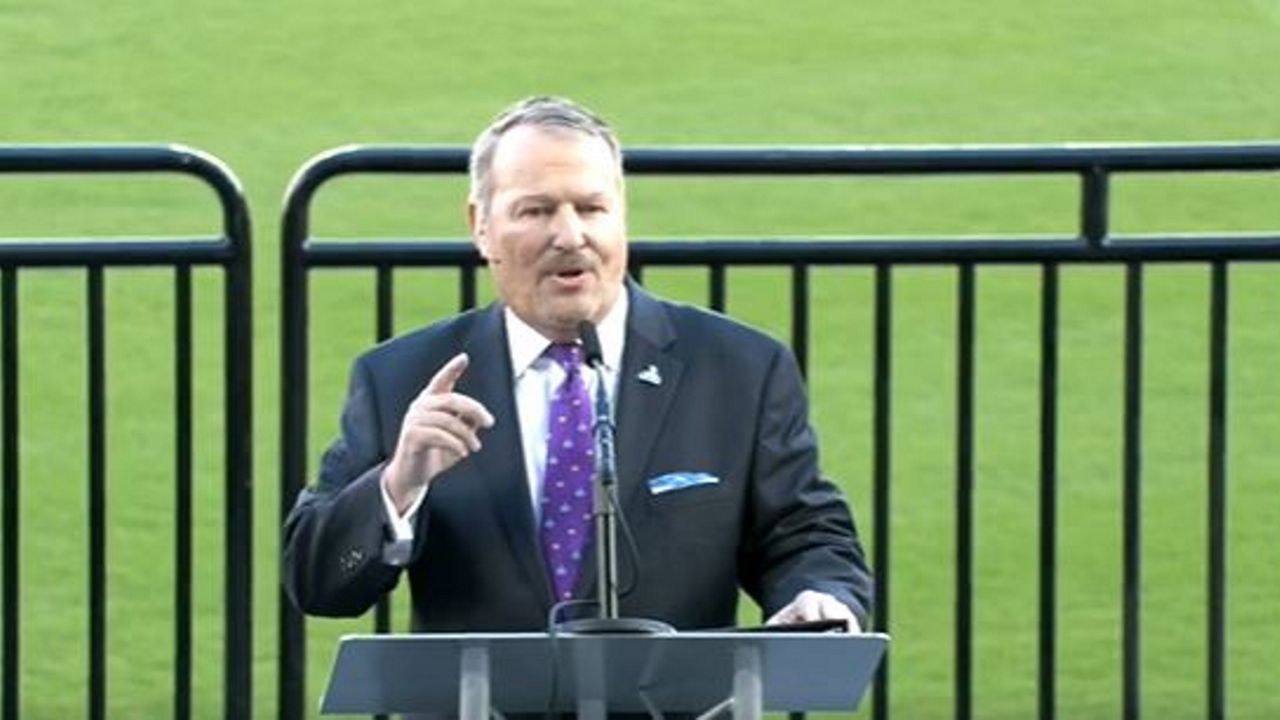ORLANDO, Fla. — In his annual State of Downtown address Monday, Orlando Mayor Buddy Dyer conceded that the COVID-19 pandemic negatively impacted the heart of the city in some ways over the past two years but that the city is in a strong position to take advantage of changes that have taken place.
“The pandemic has ushered in a realignment in how people live and work and how companies locate and expand and do business,” Dyer said. “So, it makes sense that as so much of our lives and economy are influx, so is the state of our downtown. But being influx is not the same as being in trouble.”
Dyer focused his speech on five key factors: development, business growth, housing and homelessness, downtown amenities, and mobility.
Looking to the next five to 10 years, development plans have increased, not slowed, during the pandemic, Dyer said.
“Because of the work we have done together, Orlando is well-positioned to take advantage of the new dynamics,” Dyer said.
The Creative Village “has sprung to life” during the COVID pandemic and will affect each of the key challenges and causes for celebration, he said.
According to Dyer, “Development did not slow during the pandemic. It actually sped up.”
Downtown Orlando historically sees the addition of one major office tower every 10 years, but two towers have just been completed and two more are ready to get started – one in Creative Village and one on Church Street – Dyer said.
On growth next 5-10 years for @citybeautiful, @orlandomayor says permitting for development in 2021 surpassed both 2020 & 2019 (which were both on par). Also says he wants to focus on managing the growth of Orlando while working on affordable housing & transportation. @MyNews13
— Spectrum News Asher Wildman (@AsherWildman13) December 13, 2021
In terms of small businesses, Dyer said he believes downtown is a bit "bar heavy" and that he would like to see more family-oriented entertainment venues.
In terms of downtown amenities not related to sporting events, Dyer said the previous record for shows and concerts was 43 and that the city is on pace to break that mark by 50% in 2021.
On downtown @citybeautiful events and amenities @orlandomayor says, it has been a banner year for non-sporting events & family shows at @AmwayCenter & @CWStadium. Record was 43 shows in a single year, on pace in 2021 to break that by 50%. @MyNews13
— Spectrum News Asher Wildman (@AsherWildman13) December 13, 2021
The meeting at Exploria Stadium was largely an open forum. After his initial remarks, he opened it up for questions from the people who attended, and his comments came in response to those questions.
One person asked how likely it is that Orlando will get to host some games in soccer's World Cup in 2026. Dyer said he is very optimistic. He pointed out that 10-12 cities in the United States could be selected to host games and that two cities in Canada and three in Mexico will be chosen.
Others raised questions about what the city can do to have an impact on the effects of homelessness on a family-friendly atmosphere and the limited hours of SunRail to allow people to take it downtown and get home at night and on weekends.
Dyer said those concerns depend upon other factors.
"We have to have @RideSunRail go to the airport. When that happens it will have more times and run seven days a week." -@orlandomayor
— Spectrum News Asher Wildman (@AsherWildman13) December 13, 2021
Also mentions the penny sales tax will need to be passed so that Sunrail and @lynxbusorlando can continue to expand.@MyNews13
Homelessness is a concern for other reasons, too, Dyer said. He indicated that downtown should be for everyone and that the city has made some investments to try to improve housing affordability for more people.
Housing & homelessness in @citybeautiful, @orlandomayor says downtown must be for everyone. City has invested $21 million in to affordable housing. Since 2017, city has build or rehabilitated over 1,000 units. "Fighting homeless is not easy." @MyNews13
— Spectrum News Asher Wildman (@AsherWildman13) December 13, 2021
The city cannot solve homelessness by itself, Dyer said.
Housing & homelessness in @citybeautiful, @orlandomayor says Central Florida is one of the places where wages are low and housing prices are high, and that is something that needs to be addressed on a regional basis. @MyNews13
— Spectrum News Asher Wildman (@AsherWildman13) December 13, 2021
In terms of the ability to get to and from downtown, Dyer pointed to the expected completion of the I-4 Ultimate project next year and the construction of the Brightline high speed rail as key factors that will help growth continue.
On Mobility in @citybeautiful- By end of year @I4Ultimate will be complete, @GoBrightline will be up next year, @lynxbusorlando continues to grow. Next month connector trail for bicyclists will begin. Orange Ave and Magnolia looking to expand in to two-way corridors. @MyNews13
— Spectrum News Asher Wildman (@AsherWildman13) December 13, 2021



